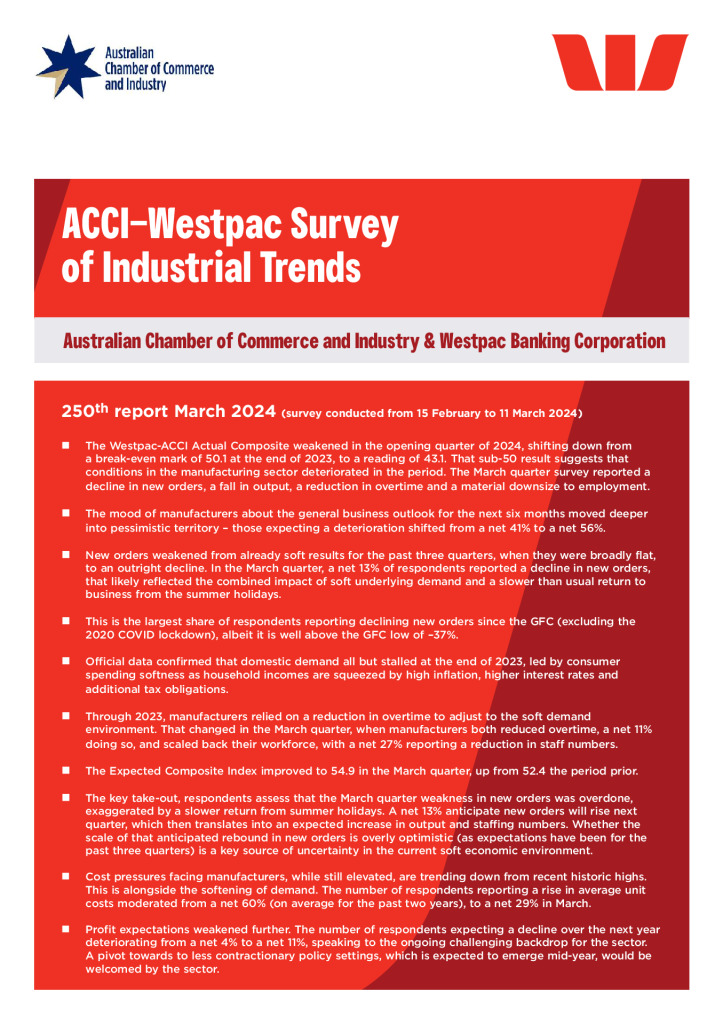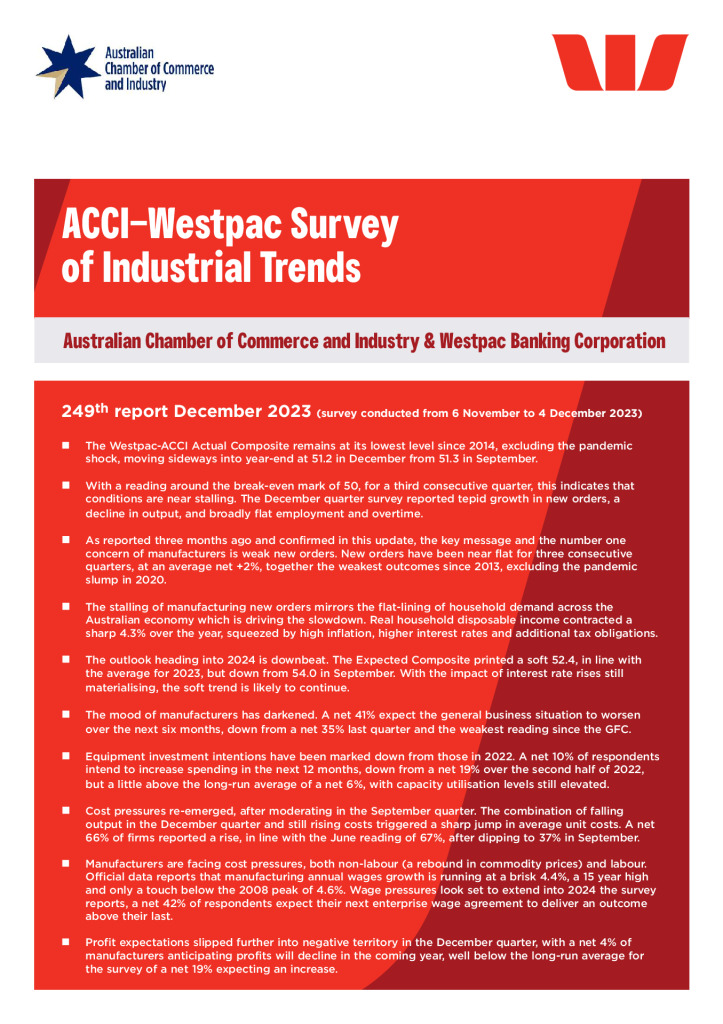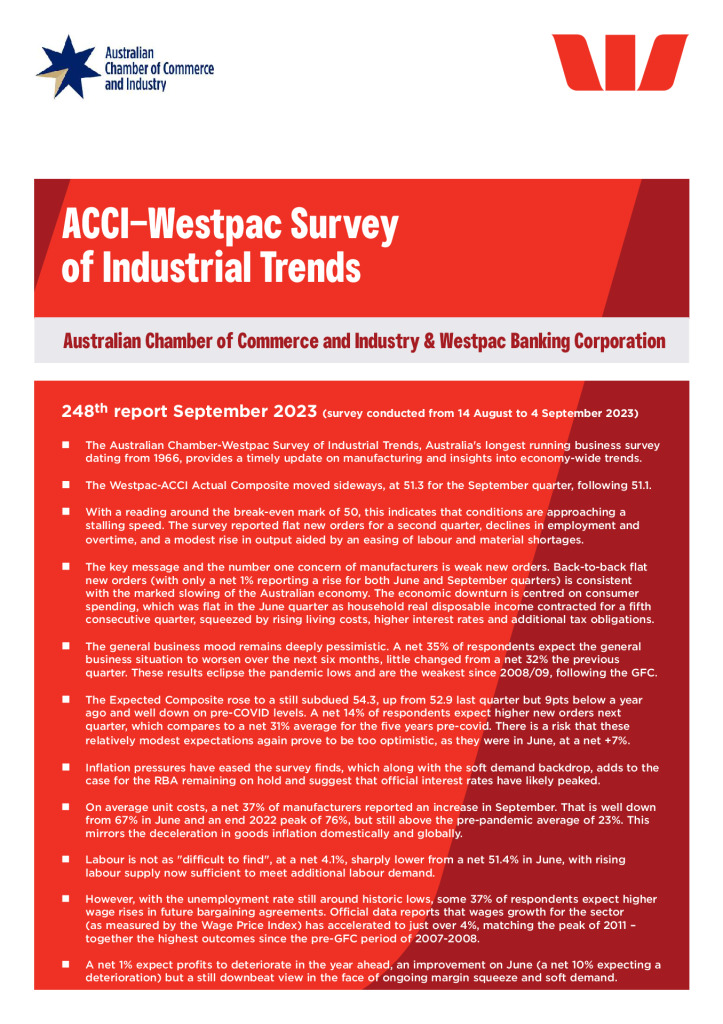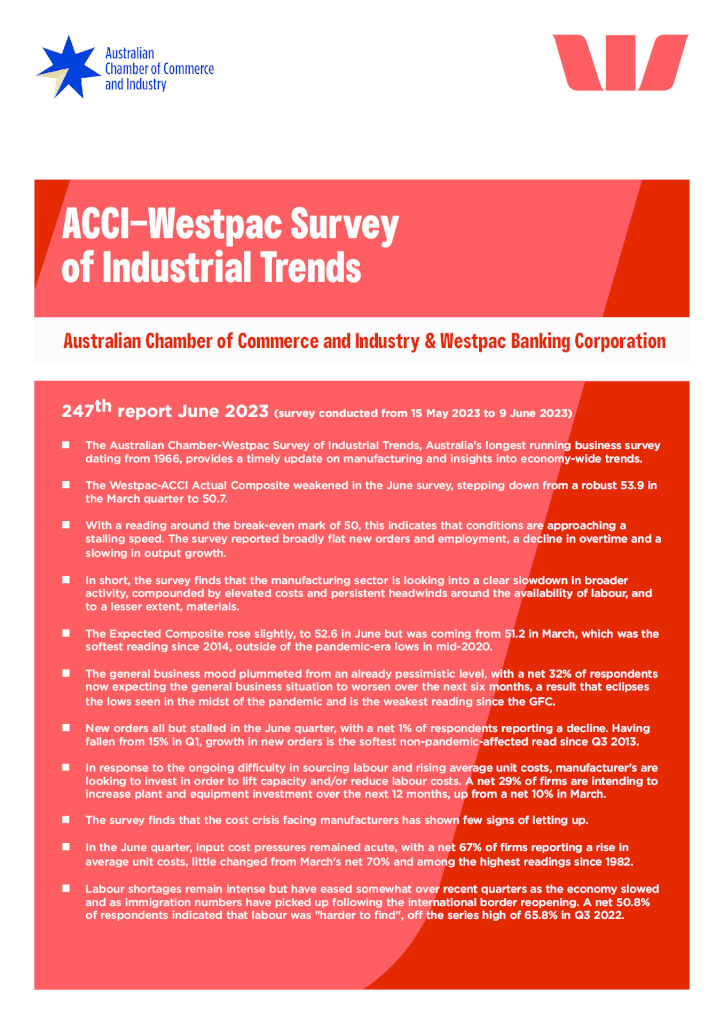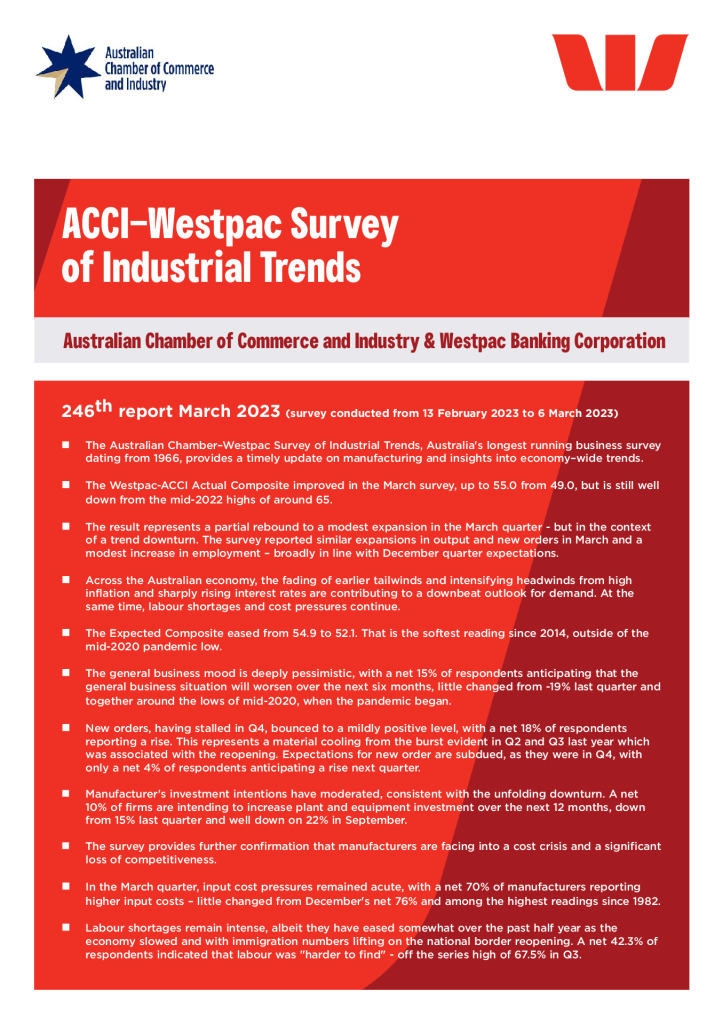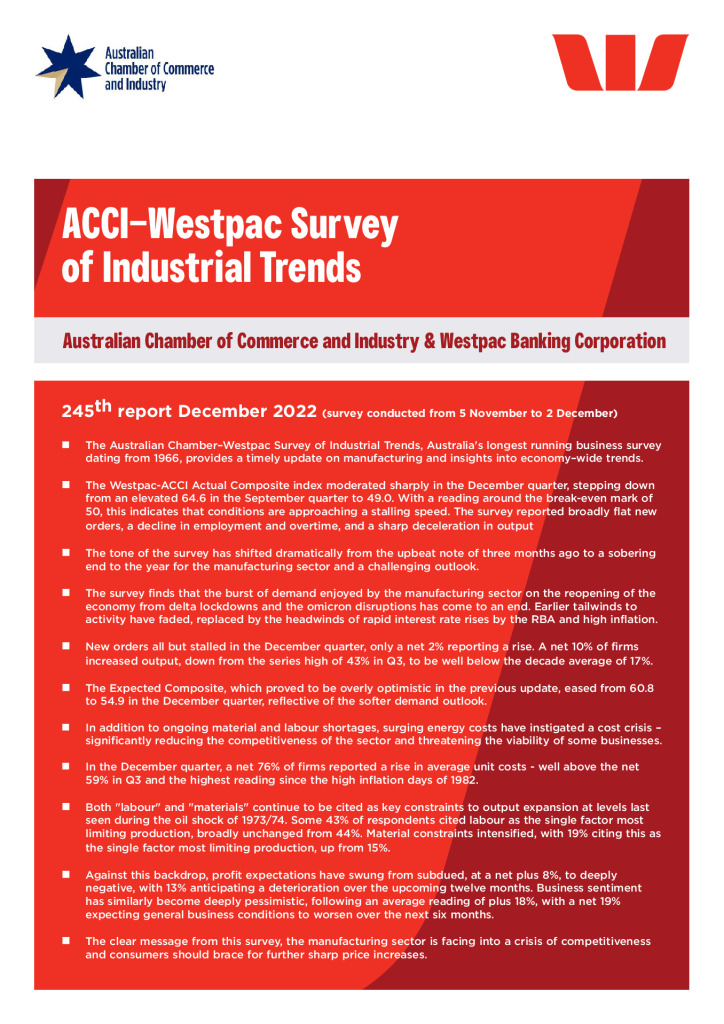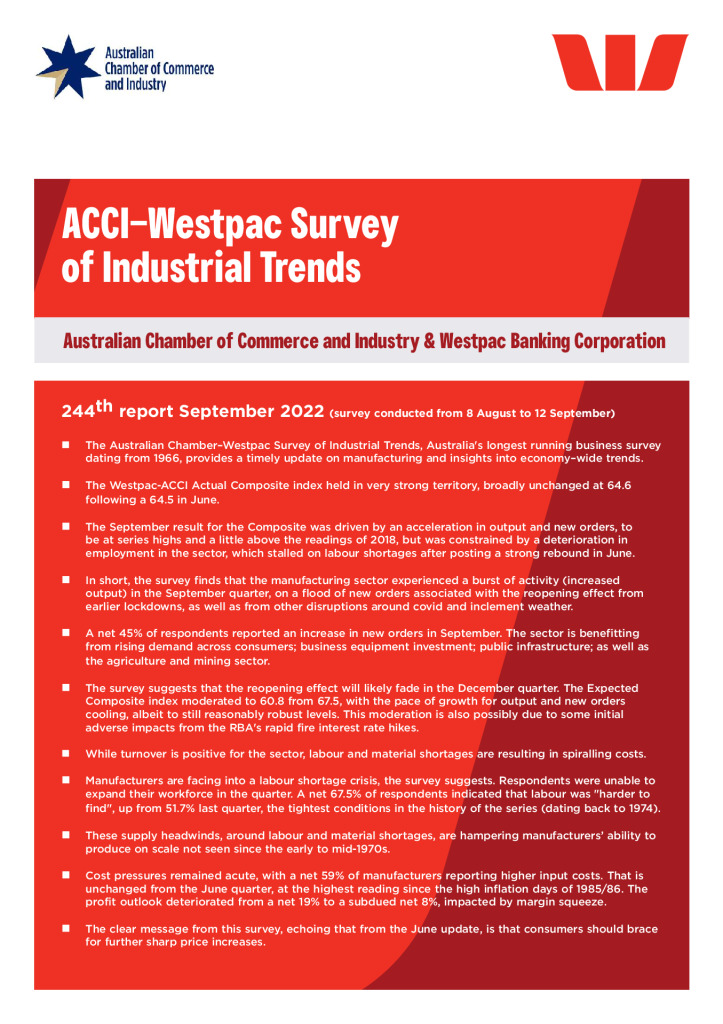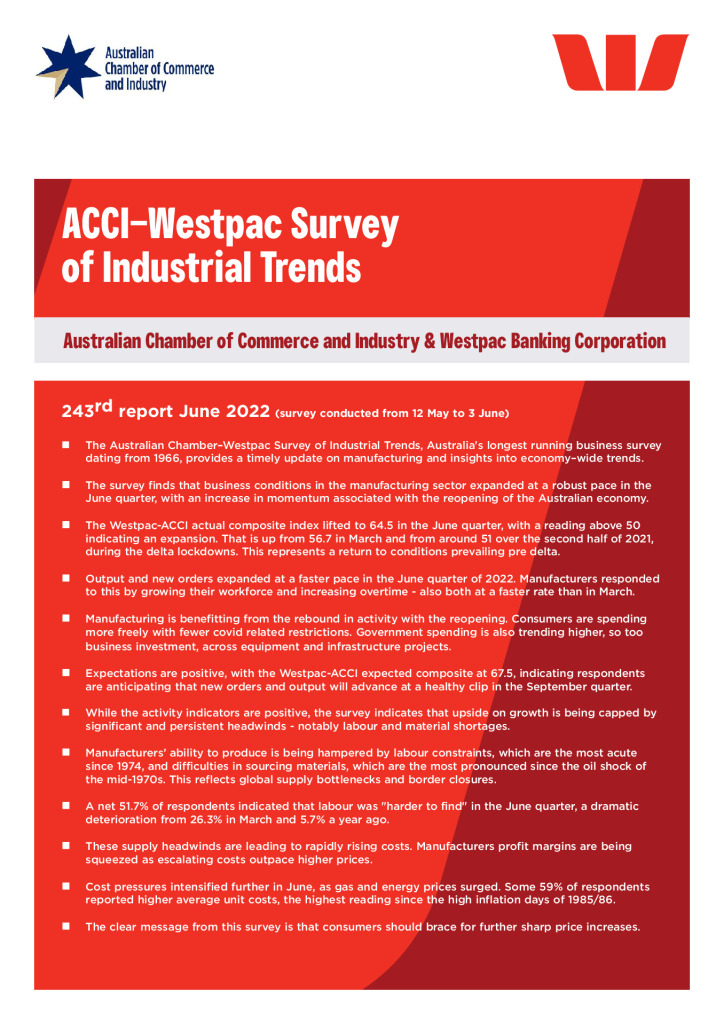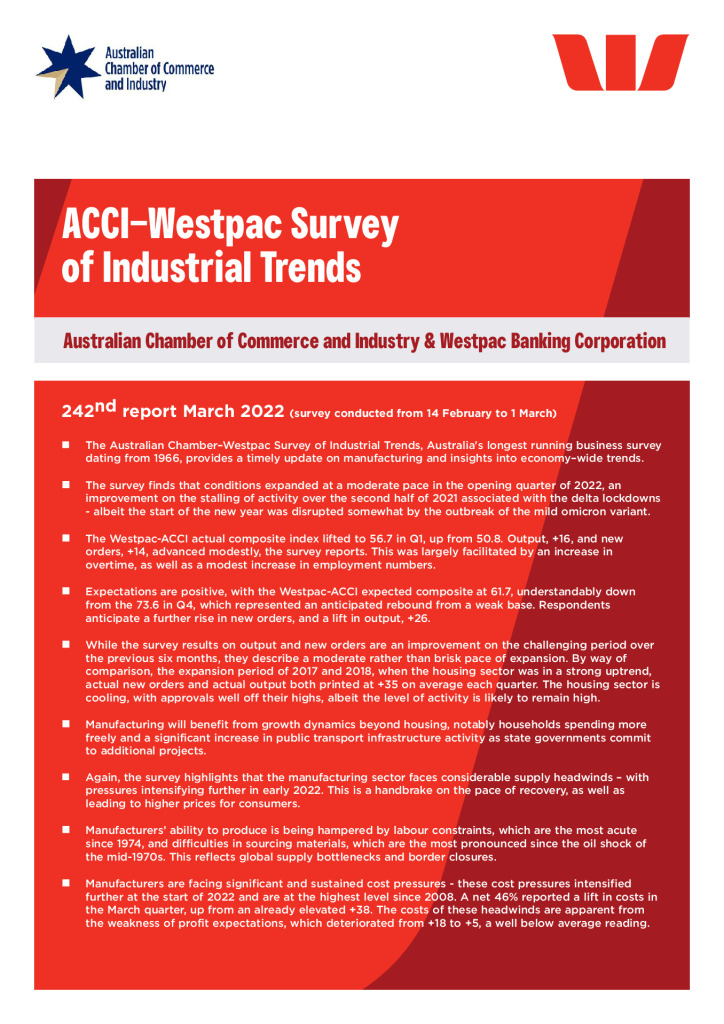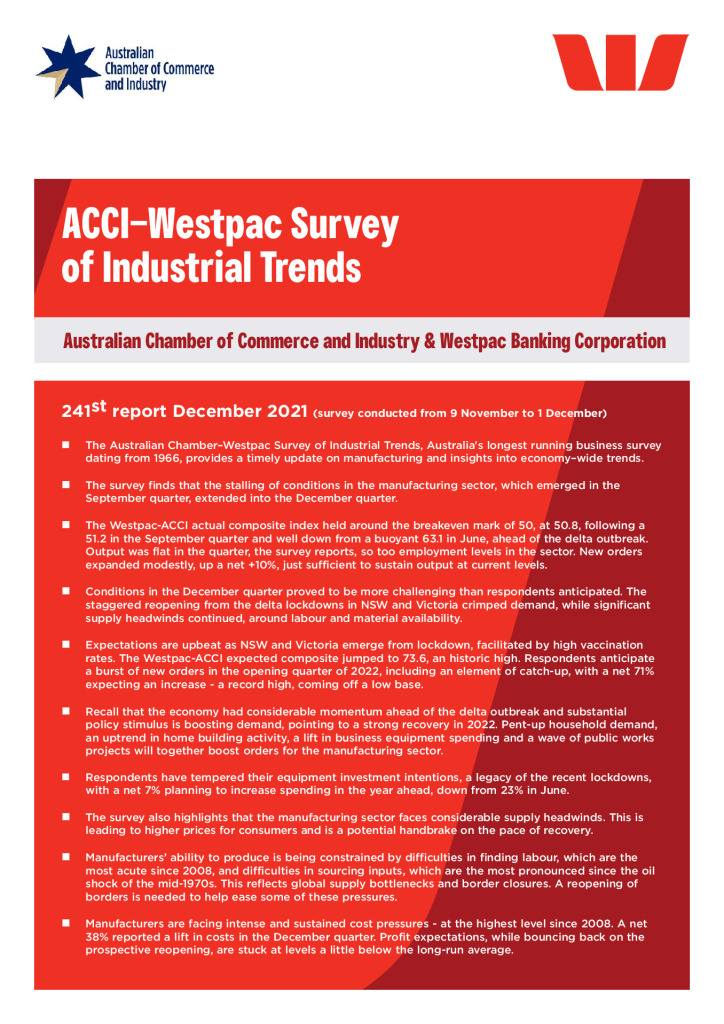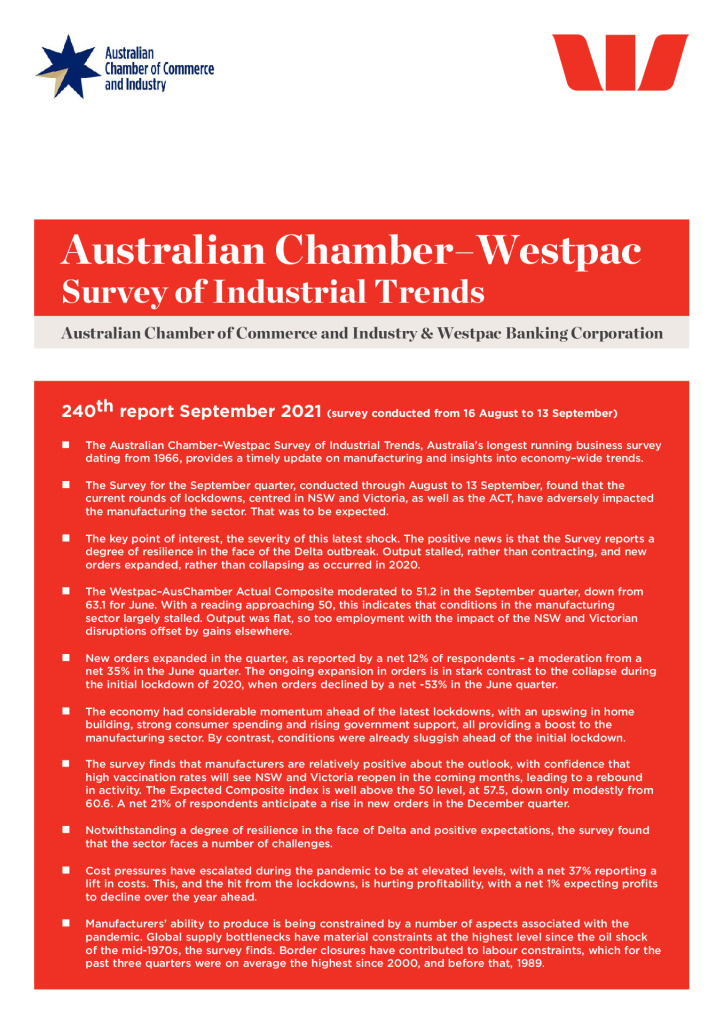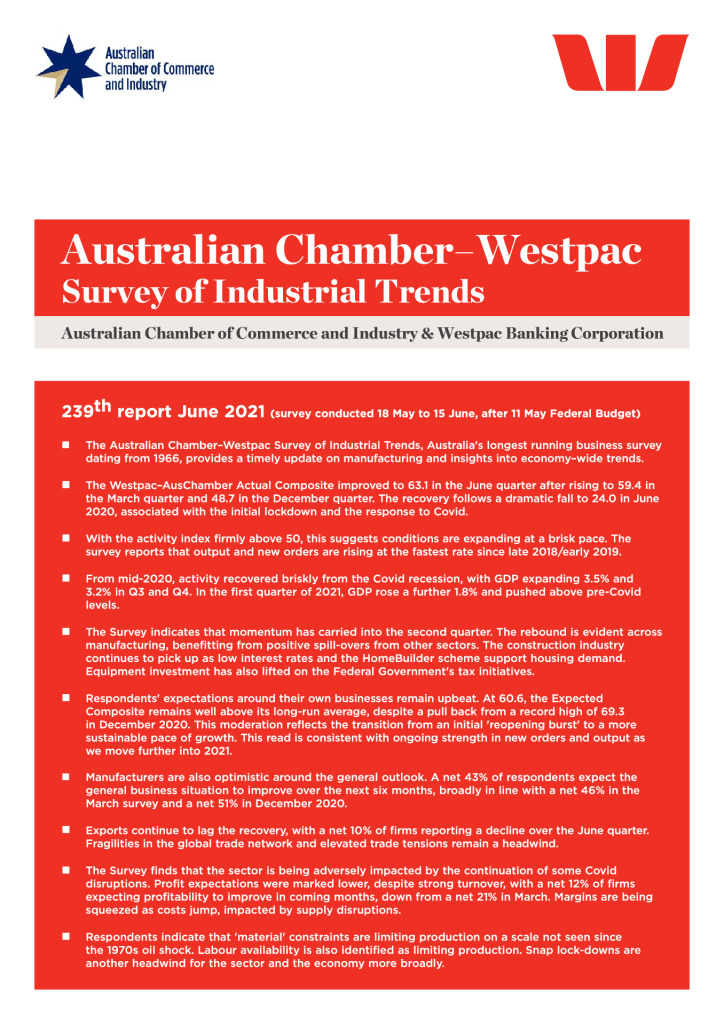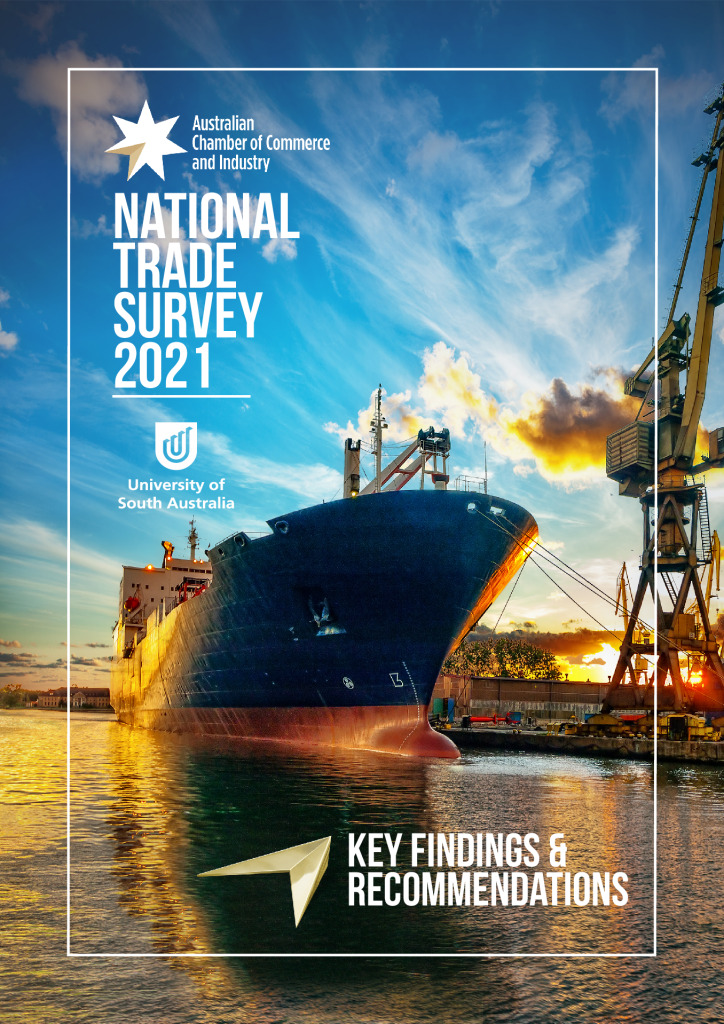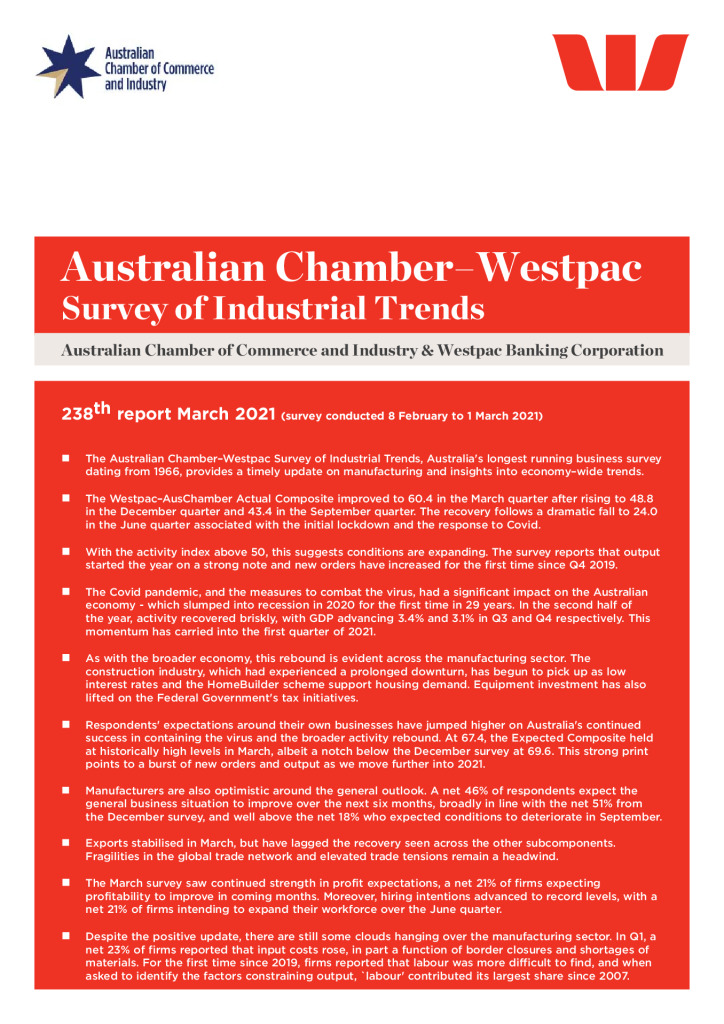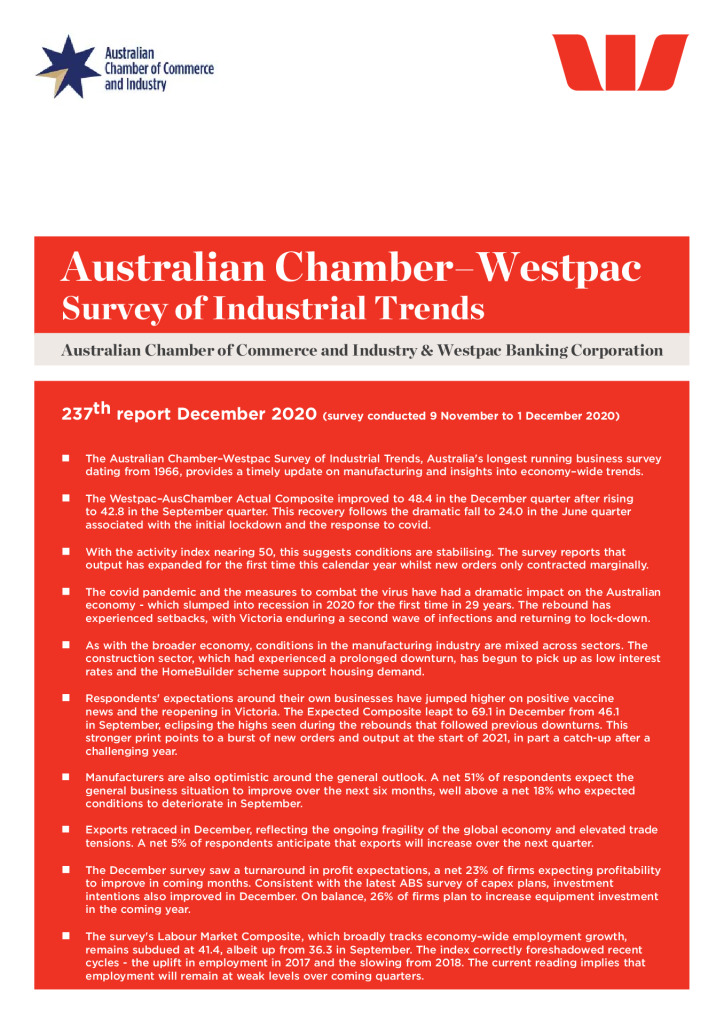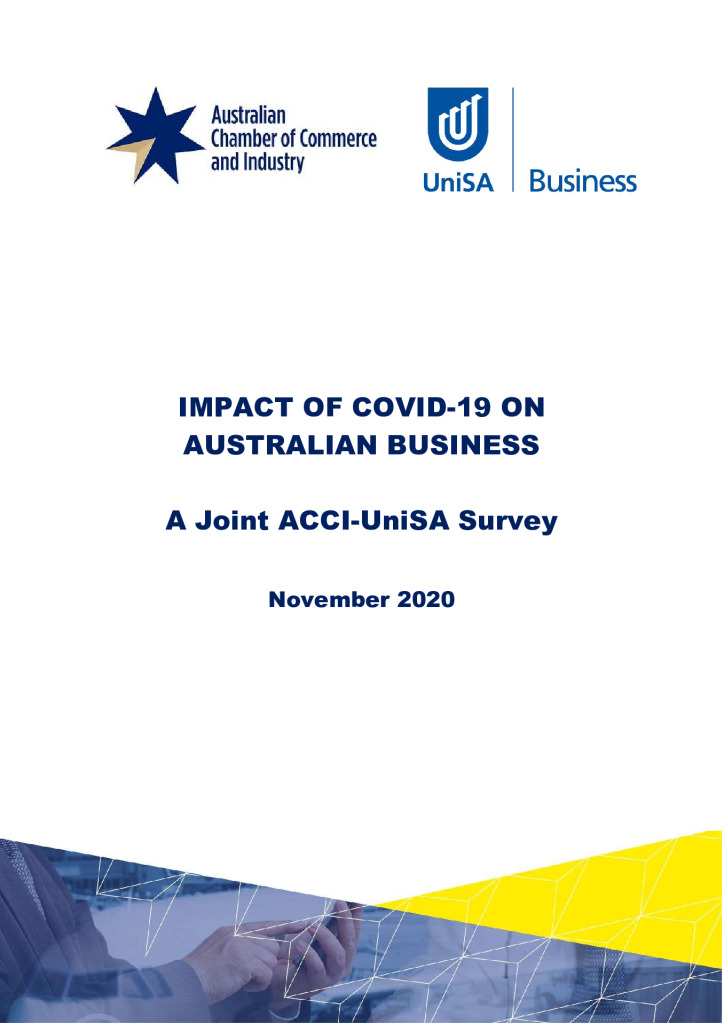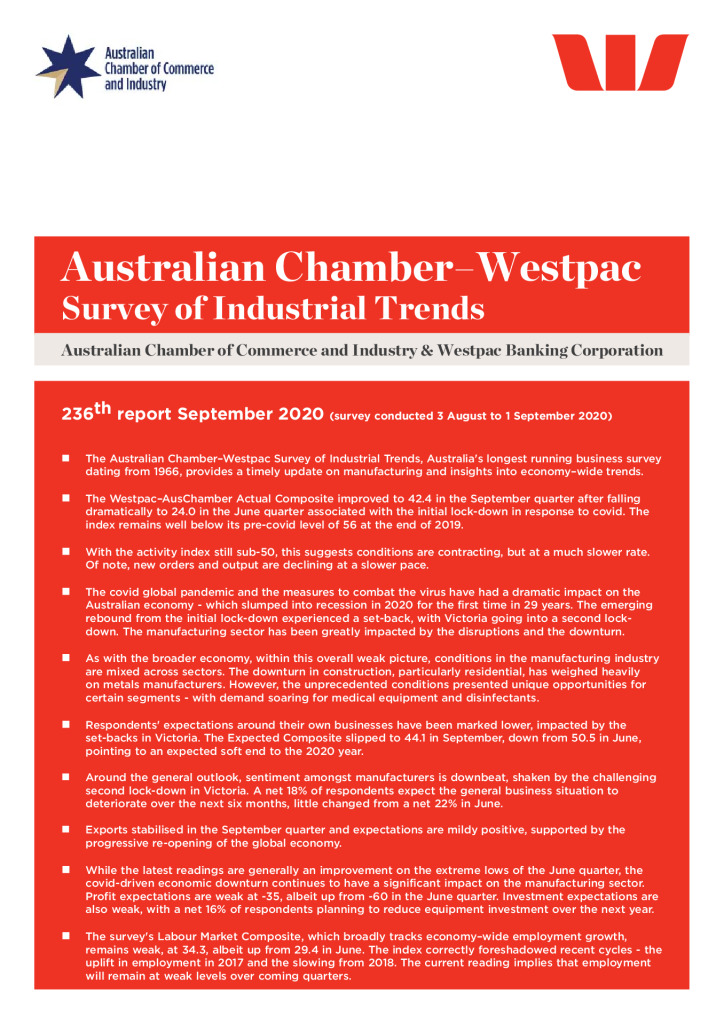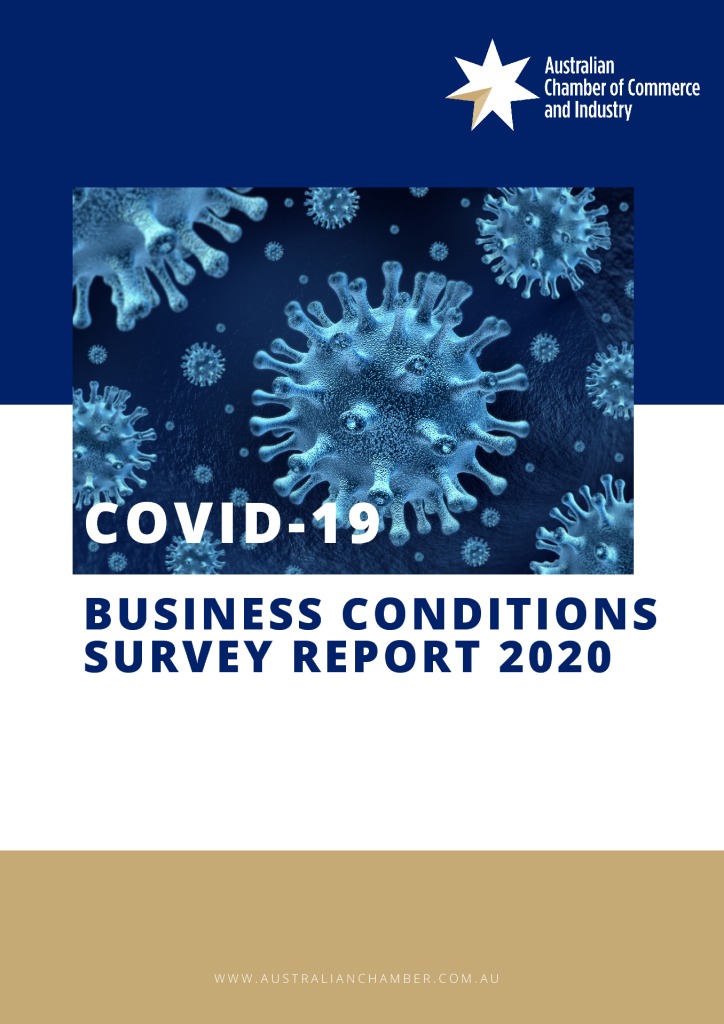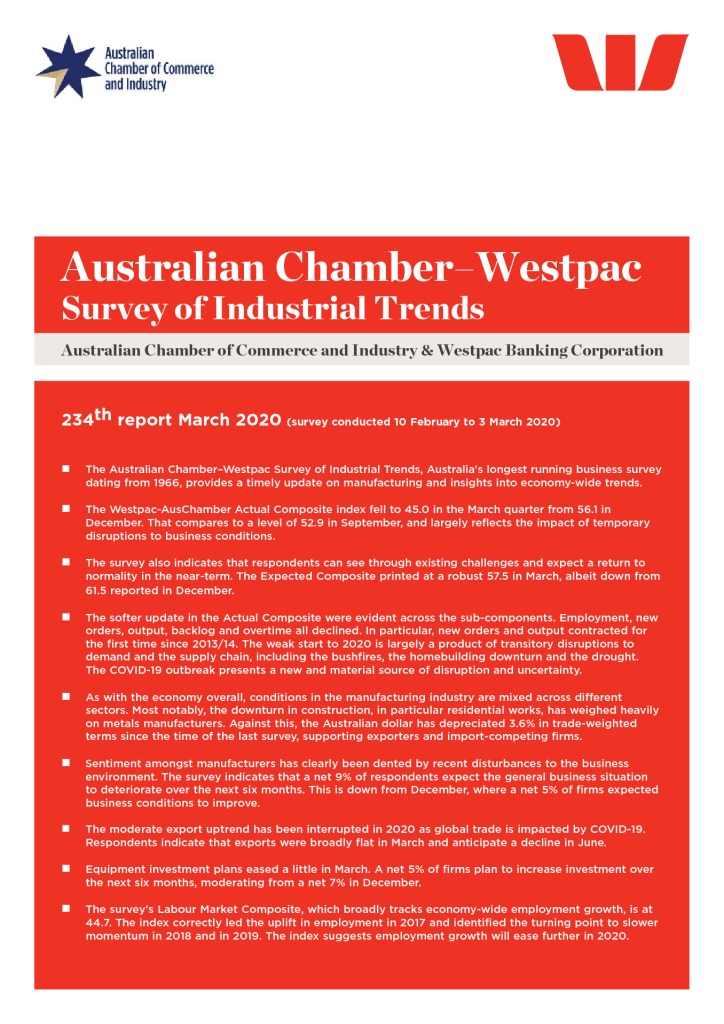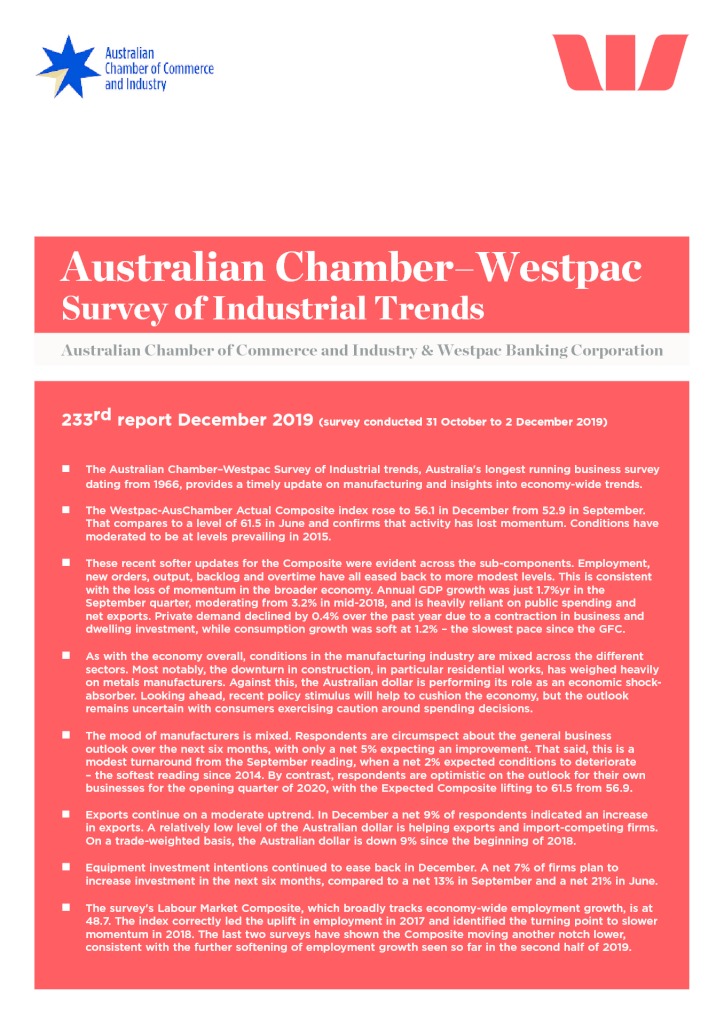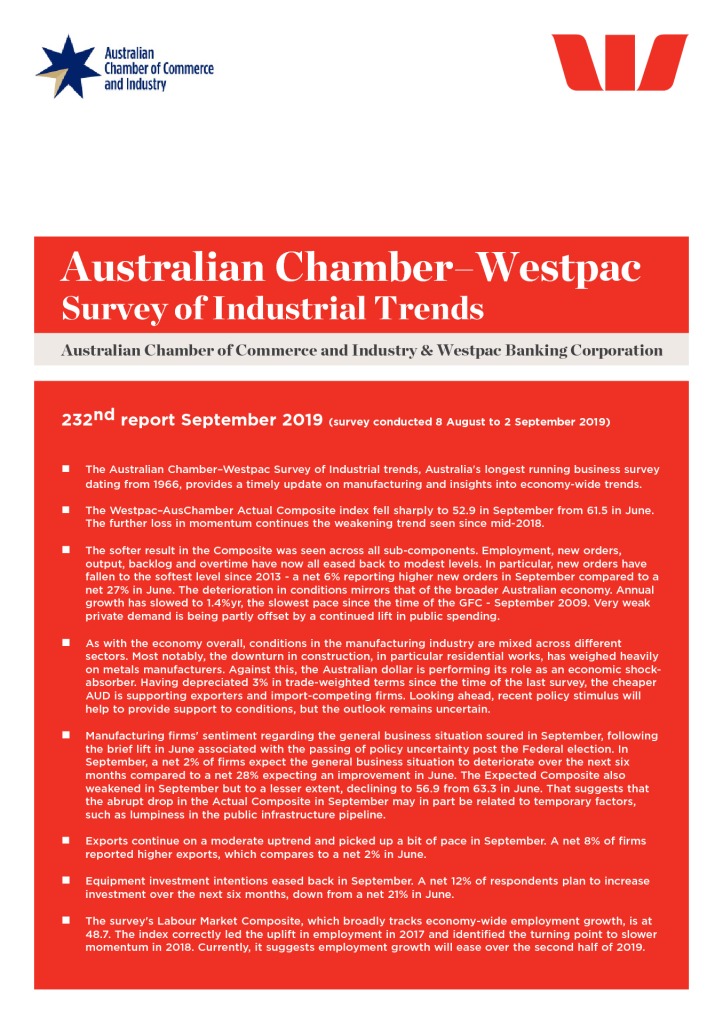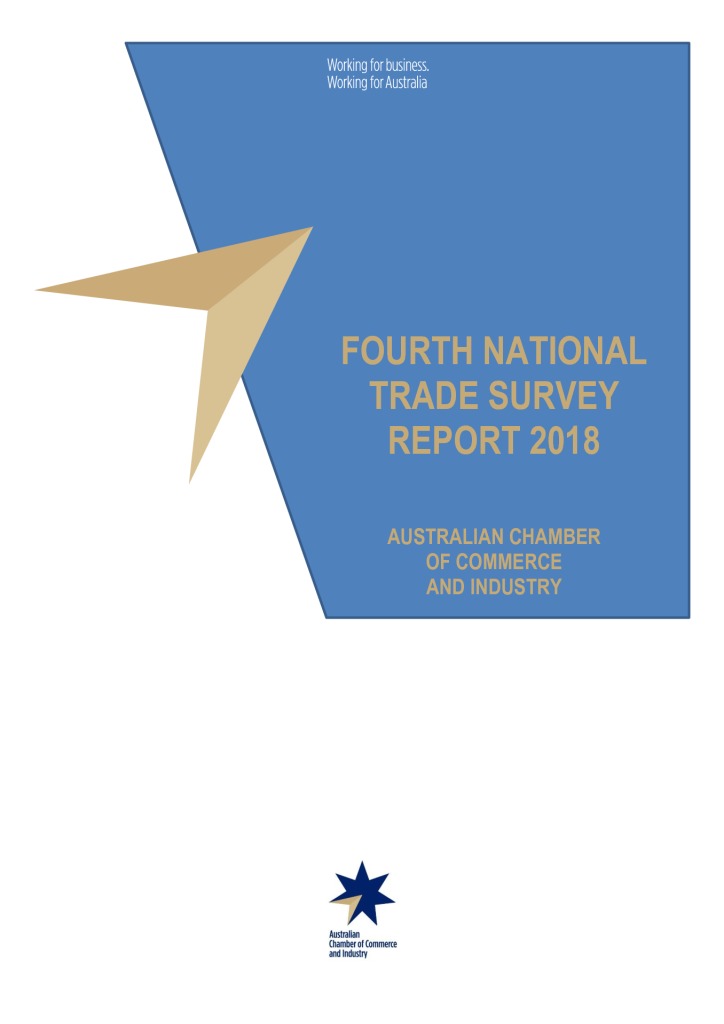Member Login
Surveys
We conduct regular surveys to check the pulse of Australian businesses and inform our policy positions. Our surveys are intended to inform businesses, policy makers and the community on the condition of industry. They are frequently cited in the media and considered by the Reserve Bank of Australia.
The fieldwork for the ACCI-Westpac Survey of Industrial Trends is being conducted by Lonergan Research. You may receive communications directly from Lonergan Research requesting participation in this project. Lonergan Research can be contacted on [email protected] or by phone on 02 9046 5600 (during business hours).
ACCI-Westpac Survey of Industrial Trends
ACCI Small Business Conditions Survey
ACCI-Westpac Survey of Industrial Trends June 2024
The broader economic backdrop for manufacturers has been challenging over the past year, highlighted
by stalling new orders growth. This culminated in a material decline in orders in March 2024, marking a
slower than usual return to business from the summer holidays. That weakness was not expected to last
though, and orders have posted a solid rebound in June 2024, with a net 20% of firms reporting a rise.
ACCI-Westpac Survey of Industrial Trends
The Westpac-ACCI Actual Composite weakened in the opening quarter of 2024, shifting down from
a break-even mark of 50.1 at the end of 2023, to a reading of 43.1. That sub-50 result suggests that
conditions in the manufacturing sector deteriorated in the period. The March quarter survey reported a
decline in new orders, a fall in output, a reduction in overtime and a material downsize to employment.
ACCI-Westpac Survey of Industrial Trends
Australia’s manufacturing sector is feeling the impact of the slowing economy following an extended period of high inflation and rising interest rates, according to the latest ACCI-Westpac Survey of Industrial Trends for Q4 2023.
ACCI chief of policy and advocacy David Alexander said the December quarter survey demonstrated that businesses across the country are feeling the impact of a slowing economy, high inflation, and rising interest rates.
“Profit expectations remain in negative territory for the third consecutive quarter as margins continue to be squeezed by rising input and wage costs, leaving businesses limited opportunity to pass these on through higher prices. ”
ACCI-Westpac Survey of Industrial Trends
Australian manufacturing is facing challenges on multiple fronts, the latest ACCI-Westpac Industrial Trends Survey has found.
“Manufacturers are starting to feel the strain of slowing orders and it is reflected in their hiring and investment intentions. Australia’s broader economic slowdown has begun to affect the manufacturing sector,” ACCI chief executive officer Andrew McKellar said.
“Labour shortages that gripped the sector are no longer the central concern. Rather, it was a lack of new orders over the last six months that limited production.”
ACCI-Westpac Survey of Industrial Trends | June 2023
The Australian Chamber-Westpac Survey of Industrial Trends, Australia’s longest running business survey dating from 1966, provides a timely update on manufacturing and insights into economy-wide trends.
ACCI–Westpac Survey of Industrial Trends | March 2023
The Australian Chamber–Westpac Survey of Industrial Trends, Australia’s longest running business survey dating from 1966, provides a timely update on manufacturing and insights into economy–wide trends.
ACCI–Westpac Survey of Industrial Trends | December 2022
The Australian Chamber–Westpac Survey of Industrial Trends, Australia’s longest running business survey dating from 1966, provides a timely update on manufacturing and insights into economy–wide trends.
ACCI–Westpac Survey of Industrial Trends | September 2022
The Australian Chamber–Westpac Survey of Industrial Trends, Australia’s longest running business survey dating from 1966, provides a timely update on manufacturing and insights into economy–wide trends.
ACCI–Westpac Survey of Industrial Trends | June 2022
The Australian Chamber–Westpac Survey of Industrial Trends, Australia’s longest running business survey dating from 1966, provides a timely update on manufacturing and insights into economy–wide trends.
ACCI–Westpac Survey of Industrial Trends | March 2022
The Australian Chamber–Westpac Survey of Industrial Trends, Australia’s longest running business survey dating from 1966, provides a timely update on manufacturing and insights into economy–wide trends. The survey finds that conditions expanded at a moderate pace in the opening quarter of 2022, an improvement on the stalling of activity over the second half of 2021 associated with the delta lockdowns – albeit the start of the new year was disrupted somewhat by the outbreak of the mild omicron variant.
ACCI – Westpac Survey of Industrial Trends | December 2021
The Australian Chamber–Westpac Survey of Industrial Trends, Australia’s longest running business survey dating from 1966, provides a timely update on manufacturing and insights into economy–wide trends. The survey finds that the stalling of conditions in the manufacturing sector, which emerged in the September quarter, extended into the December quarter.
Download
ACCIWestpac2021Q4
PDF 245.67 KB
Australian Chamber – Westpac Survey of Industrial Trends | September 2021
The Australian Chamber–Westpac Survey of Industrial Trends, Australia’s longest running business survey dating from 1966, provides a timely update on manufacturing and insights into economy–wide trends. The Survey for the September quarter, conducted through August to 13 September, found that the current rounds of lockdowns, centred in NSW and Victoria, as well as the ACT, have adversely impacted the manufacturing the sector. That was to be expected.
Australian Chamber – Westpac Survey of Industrial Trends | June 2021
The Westpac-AusChamber Actual Composite improved to 63.1 in the June quarter after rising to 59.4 in the March quarter and 48.7 in the December quarter. The recovery follows a dramatic fall to 24.0 in June 2020, associated with the initial lockdown and the response to Covid.
The Impact of Payroll Tax on Business – 2021 Survey
National Trade Survey 2021 – Key Findings and Recommendations
The Australian Chamber of Commerce and Industry (ACCI) conducted its fifth National Trade Survey during one of the most volatile times for global trade in recent history.
On January 31, 2020, the World Health Organisation (WHO) issued a Global Health Emergency in response to COVID-19 and thereafter until the present day, trade and the movement of people have been severely disrupted. The results of this survey are notable for two reasons. After five surveys with different respondent cohorts, the fact that many of the results across multiple years and cohorts arrive at similar outcomes shows that many of the issues and concerns raised are enduring and need to be addressed.
The second reason is that the qualitative views were captured during both the global pandemic and concurrent geopolitical tensions. The report makes 20 recommendations to improve the international trade environment for Australian businesses and we look forward to working with the Federal Government to implement them.
National Trade Survey 2021 – Full Report
The Australian Chamber of Commerce and Industry (ACCI) conducted its fifth National Trade Survey during one of the most volatile times for global trade in recent history.
Australian Chamber–Westpac Survey of Industrial Trends | March 2021
The Westpac–AusChamber Actual Composite improved to 60.4 in the March quarter after rising to 48.8 in the December quarter and 43.4 in the September quarter. The recovery follows a dramatic fall to 24.0 in the June quarter associated with the initial lockdown and the response to Covid.
Download
AusChamberWestpac2021Q1
PDF 173.5 KB
Australian Chamber–Westpac Survey of Industrial Trends | December 2020
The Westpac–AusChamber Actual Composite improved to 48.4 in the December quarter after rising to 42.8 in the September quarter. This recovery follows the dramatic fall to 24.0 in the June quarter associated with the initial lockdown and the response to covid.
Impact of COVID-19 on Australian Business | A joint ACCI-UniSA Survey
A new joint survey produced by ACCI and the University of South Australia has found that maintaining supply chains continues to be one of the most challenging issues for Australian businesses to overcome during the pandemic. COVID Normal will become the new normal for Australian businesses. The impact of the pandemic has changed the way we trade, operate and communicate. The survey also shows the necessity for governments and the private sector to begin the process of de-risking our economy from further outbreaks or similarly crippling events.
Australian Chamber–Westpac Survey of Industrial Trends | September 2020
The Westpac–AusChamber Actual Composite improved to 42.4 in the September quarter after falling dramatically to 24.0 in the June quarter associated with the initial lock-down in response to covid. The index remains well below its pre-covid level of 56 at the end of 2019.
Covid-19 Business Conditions Survey Report- 3rd Edition
This survey examines the impact of social distancing and travel restrictions on businesses, and the pace in the easing these restrictions. It also seeks business’ views on which Government support measures are of greatest benefit and how prepared they are for the winding back of this support.
Australian Chamber–Westpac Survey of Industrial Trends | June 2020
The Westpac–AusChamber Actual Composite index fell to 24.0 in the June quarter, to be around the historic low for the series, indicating a sharp contraction in activity in the period. That is down from 45.0 in March and compares to 52.9 in December 2019.
Download
AusChamberWestpac2020Q2
PDF 644.1 KB
Covid-19 Business Conditions Survey Report- 2nd Edition
The results of the second ACCI survey are now available. We surveyed a broad cross-section of our membership to examine the benefit of JobKeeper, the effect of social distancing and the changes made to business operations to meet social distancing requirements.
Covid-19 Business Conditions Survey Report
The survey was undertaken between 30 March and 17 April and involved 1,497 businesses across all states and territories. We would like to acknowledge the assistance of our states and territories chamber associates and industry association members for their assistance in developing and distributing the survey through their membership networks.
Australian Chamber–Westpac Survey of Industrial Trends | March 2020
Australian Chamber–Westpac Survey of Industrial Trends | December 2019
Australian Chamber–Westpac Survey of Industrial Trends | September 2019
Download
AusChamberWestpac2019Q3
PDF 468.2 KB
Australian Chamber National Trade Survey 2018 – Full Report
Australian Chamber National Trade Survey 2018
The Australian Chamber’s Fourth National Trade Survey, conducted in partnership with the University of South Australia’s Australian Centre for Asian Business, aims to gauge the attitudes and challenges faced by Australian businesses in the international market.
It is supported by the qualitative insights from over 200 Australian businesses over the years 2013-2018.
Australia’s role as a trade and investment partner to some of the world’s largest economies has allowed us to create jobs, wealth and opportunities for many Australian businesses.
In an era of unparalleled globalisation and technological advancement, other developed nations have begun adapting their policy settings to better place business to compete in international markets. If Australia does not do the same, we will get left behind. It is important that we put in place the right policies to help Australian businesses create and sustain jobs, and provide competitively priced goods and services.
The Fourth National Trade Survey identifies the opportunities and key barriers Australian businesses are facing, including understanding and utilisation of free trade agreements, high domestic costs and red tape, engagement in emerging markets, access to trade finance and utilisation and support of trade initiatives.
In highlighting these key issues, we hope this report sparks a national discussion on the domestic reforms needed to ensure Australian businesses remain internationally competitive and acts as an impetus for change.
Click here to download the Full Trade Survey




